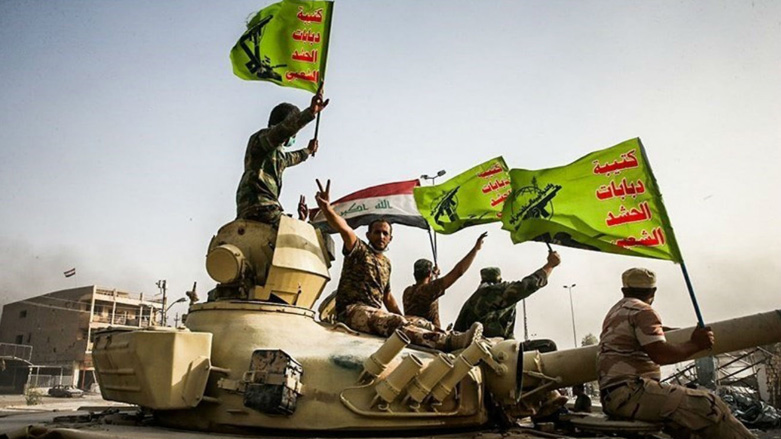US calls on Iraqi militias to stay in Iraq, not fight for Assad in Syria

WASHINGTON DC (Kurdistan 24) – State Department Spokesperson Heather Nauert called on Iraqi forces in Syria—where Shia militias from the Popular Mobilization Forces (PMF) are fighting on behalf of the regime—to return home.
“We would call on the forces, whatever forces, to remain engaged on the ground in Iraq and not go to Syria,” Nauert said on Friday, as she responded to a question from Kurdistan 24 at a press briefing.
Sheikh Maythan al-Zayadi, the head of a major PMF militia which operates under the auspices of Grand Ayatollah Ali al-Sistani, Iraq’s most senior Shia cleric and a moderate figure, recently met with Iraqi Prime Minister Haider al-Abadi.
Zayadi complained that fighters from the more extreme Shia militias, who are under Iranian control, and who have gone to Syria, receive a salary twice as large as those who remain in Iraq: $1,200 vs $600.
The money for all the fighters comes from Iraq’s federal budget. They are all supposed to be under Abadi’s command. However, there are serious questions as to whether he exercises much authority over the Iranian-backed groups.
Iraq’s Al-Ghad Press reported on Thursday that Abadi was “unable” to resolve this problem, “given his weakness and lack of firmness in making major decisions.”
As the US had already strongly denounced the regime in Syria when the exchange at the State Department briefing occurred—and was just hours away from bombing chemical weapons sites there—the US criticism of Iraqis fighting in support of Bashar al-Assad’s regime was notably mild.
The same US reluctance to criticize the Abadi government was also evident, as Nauert responded to criticism from Iraq’s Foreign Minister, Ibrahim al-Jafaari.
At an Arab League Foreign Minister’s meeting in Jeddah on Friday, Jafaari warned that an airstrike on Syria would be “a catastrophic defeat” and put all countries “in jeopardy.”
Jafaari was an Iraqi opposition figure, living in London, until Operation Iraqi Freedom overthrew Saddam Hussein’s regime. He became Iraqi Prime Minister in 2005, but was obliged to step down the following year, as the US and UK concluded that he was ineffectual.
Asked about Jafaari’s criticism, the State Department Spokesperson responded, “Iraq has its own unique concerns.”
“It’s certainly okay,” she said, for Iraqis “to address their feelings about any actions the United States Government and other governments may take.”
Entifadh Qanbar, an Iraqi-American and President of the Future Foundation in Washington DC, however, denounced the Iraqi government’s “hypocrisy.”
Qanbar explained to Kurdistan 24 that Baghdad had recently issued a decree confiscating the land of some 4,000 Baathists in Iraq, most of whom are old and retired.
“How can they support the Baathists in Syria, but oppose them in Iraq?,” Qanbar asked.
“If the Baathists are a threat to democracy in Iraq, aren’t they a threat to democracy in Syria, particularly given Bashar al-Assad’s brutalities against his own people?”
Qanbar also noted that Assad had been behind a coordinated wave of bombings on August 19, 2009, and the targets included the Iraqi Foreign Ministry.
Iraqi officials charged then that Syria had supported al-Qaeda in carrying out the attacks. It was, thus, highly ironic, Qanbar said, that Iraq’s Foreign Minister now chose to ignore that.
The basic reason for Jafaari’s opposition to an attack on Syria, Qanbar affirmed, was Iran’s very strong influence in Baghdad.
Indeed, following the US, French, and UK airstrikes, the Iraqi Foreign Ministry issued a statement later on Saturday, criticizing them as “a dangerous escalation.”
Editing by Nadia Riva
